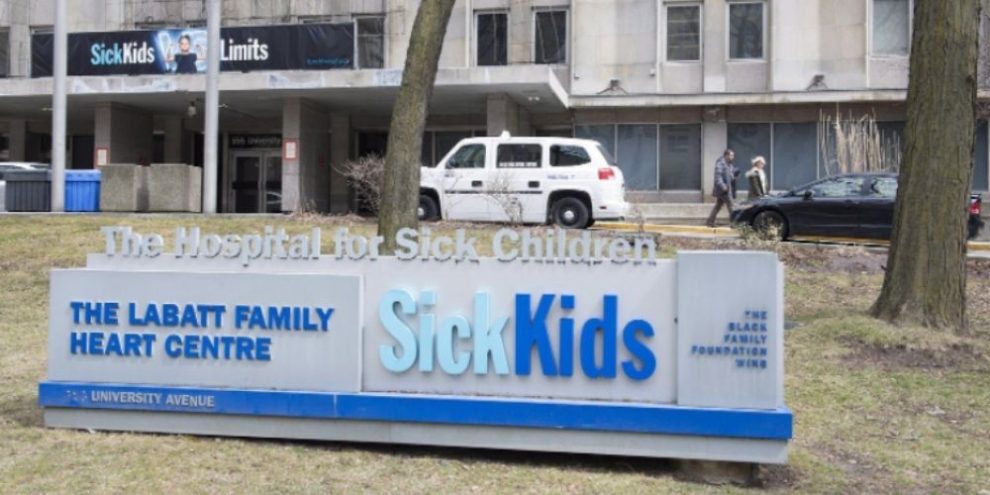
By Cassandra Szklarski in Toronto
Toronto's Hospital for Sick Children says it has identified seven probable cases of severe acute hepatitis of unknown origin.
The research and pediatric hospital, also known as SickKids, says the mysterious cases were identified between Oct. 1, 2021 and April 30, 2022 and reported to Public Health Ontario.
Dr. Upton Allen, the hospital's division head of infectious diseases, said Tuesday that large children's hospitals such as his regularly see children with severe hepatitis and that the overall numbers "seems to be pretty consistent with what we've seen before."
"But we're really carefully looking at those numbers in really great detail," Allen added.
World Health Organization officials said last week they had reports of almost 300 probable cases in 20 countries. More than 100 possible cases have emerged among children in the United States, including five deaths.
Allen could not say if the seven cases singled out by SickKids are different from what they would have seen in prior years.
"What we can say is that we have cases that fit the World Health Organization case definition. But we're not yet able to say definitively that these cases truly represent a new signal," he said.
SickKids said its infectious disease specialists were on the lookout for youngsters with liver disease symptoms that could include new onset of dark urine, pale stool and/or jaundice, which can turn the whites of eyes a distinctive yellow colour.
They also recommended a lower threshold for referral to specialist care.
Allen said confidentiality concerns prevented him from disclosing details of the seven cases but that the children were previously healthy and ranged in age from less than one year to 12 years old.
He would not elaborate on their medical conditions nor whether any required a liver transplant.
"But what I can say is that severe hepatitis in general will inevitably end up with some kids requiring transplantation if the hepatitis is particularly severe," he said.
Ottawa pediatric health centre CHEO said Tuesday it had no suspected cases of acute pediatric hepatitis admitted to hospital. A single suspected case since December is counted in the number released by SickKids, a CHEO spokesman said by email.
Vancouver's BC Children’s Hospital also said it had not seen any cases, while a spokeswoman for Alberta Health said the province was "in the early days of working to gather information."
Canada's chief public health officer has said federal officials are working with the country's 17 pediatric centres to get a better understanding of what's going on.
Even before the pandemic, about half of all pediatric hepatitis cases that are severe would have no known cause, Dr. Theresa Tam said Friday.
"We're still at the investigation stage of trying to figure out whether any of these cases are indeed linked at all. There's always been hepatitis and some severe cases of hepatitis in children pre-pandemic and one would expect post-pandemic as well," she said.
Tam said cases that emerge in Canada are called "probable" because there's no confirmation on the specific cause. She says experts in the United Kingdom and the United States have found cases involving adenovirus type 41 "but that may or may not be the cause or the only factor leading to hepatitis in children."
Canada's deputy chief public health officer added that federal officials were also working closely with the provinces and territories in casting a wide surveillance net.
"We anticipate that there might be situations or cases coming forward that would meet that broad case definition," Dr. Howard Njoo said Friday.
There are dozens of adenoviruses, many of them associated with cold-like symptoms, fever, sore throat and pink eye.
But some versions can trigger other problems, including inflammation in the stomach and intestines. Officials are exploring a link to one particular version that's normally associated with gut inflammation.
"The verdict is still not in as to whether or not the true culprit is adenovirus," Allen said of the SickKids cases.
"The adenoviruses belong to a family of viruses that can persist in our bodies in certain cells for long period of time. And it's not unusual that if we become severely ill and we are in hospital for a reason totally unrelated to adenovirus, it's not unusual to be able to detect adenovirus in some individuals."
A case of severe hepatitis in a child would manifest as a very obvious illness, and it is rare, said Allen.
"If your kid is off, you should be plugged into your family physician, anyway, right? But I don't want people to be lining up in (emergency) because the kid started vomiting once or something," said Allen.
Aside from jaundice, dark urine and pale stool, there are other several key symptoms to look out for, SickKids noted.
Those include fever, fatigue, loss of appetite, nausea, vomiting, abdominal pain and joint pain.
With files from Laura Osman in Ottawa, and The Associated Press.
This report by The Canadian Press was first published May 10, 2022.
Feature image - The Hospital for Sick Children in Toronto is shown on Thursday, April 5, 2018. The Hospital for Sick Children says it has identified seven probable cases of severe acute hepatitis of unknown origin. THE CANADIAN PRESS/Doug Ives






